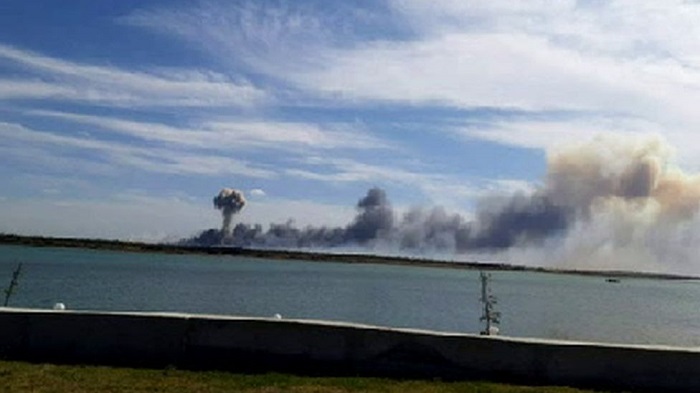
Loud blasts have been reported at a military base in Crimea, a Ukrainian peninsula that Russia annexed in 2014.
The blasts were in the western village of Novofedorivka, said Oleg Kruchkov, an adviser to the Moscow-installed regional head.
Three local witnesses told Reuters they had seen black smoke rising from the direction of the airstrip.
Russia’s defence ministry later said ammunition was detonated, but this has not been independently verified.
The ministry said there was no “fire impact” on the ammunition storage area, Russia’s state-run Ria Novosti news agency reported.
Footage has emerged on social media purportedly showing people on a beach watching plumes of smoke rising from the direction of Novofedorivka.
After arriving in the area, Russia-appointed Crimea head, Sergei Aksyonov, said a 5km (three mile) no-go zone around the blast site had been established.
So far, there have been no reports of any casualties.
Russia’s annexation of Crimea eight years ago drew widespread international condemnation.
On February 24, Moscow launched a full-scale invasion on Ukraine, using Crimea as a springboard to move Russian troops deeper inside Ukraine.
Russia’s military would be unable to operate the high-tech weapons and communications systems it has been using in Ukraine if the West were to tighten export controls, says a report.
Almost all Moscow’s modern military systems depended on western-made microelectronics, said the Royal United Services Institute (RUSI) report. Moscow has found ways to bypass sanctions and export controls. If the loopholes are closed, Russia’s military might be permanently degraded.
Researchers for RUSI, a UK think tank, spent months in Ukraine, examining 27 of Russia’s most modern military systems, either captured, brought down or abandoned by Russian troops.
They discovered at least 450 different kinds of unique, foreign-made components, most built in the US but also in other Western countries.
Products from familiar brands, such as Sony and Texas Instruments, were turning up on the battlefield in Russian weapons systems. There was no suggestion those firms had been complicit in sending components to Russia. -Reuters






